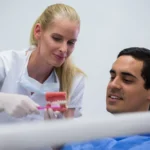Intensive Outpatient Programs: A Vital Segment in Modern Recovery Care
Intensive Outpatient Programs (IOPs) have gained a notable position in the mental health and addiction treatment spectrum, becoming a comprehensive treatment by themselves and the first line of contact for the patient’s care. This kind of advanced care treatment service provides a whole block of services and care for the management of substance use disorders, psychological support, and co-occurring disorders.
IOP treatment is characterized by not admitting patients as inpatients. It is also a place where patients can be away from hospital treatment and return to their families after several hours. Thanks to this, they can learn and practice living a drug-free life, keeping clean and staying healthy, and being assisted when they are tested.
Freedom with Accountability: The IOP Model Advantage
The IOPs are highly effective in utilizing freedom and accountability as a method of controlling addiction.
Clarifying the Role of Intensive Outpatient Programs
What Is an IOP and Who Is It For?
An Intensive Outpatient Program (IOP) is designed to hold therapy meetings at specific days and hours, targeting individuals in urgent need of healthcare and intervention who do not require residential treatment. It is mostly group therapy, supplemented by individual sessions where the participants meet at the therapist’s office, which is conducted a few times a week. Such a setup helps a group of individuals who require more than the customary weekly therapy but do not need the ever-present regulation and intensity of inpatient or residential programs.
The intensive outpatient programs near me offer professional support and guidance to patients and are an integral part of the recovery journey. These IOPs provide access to a wide selection of specialists and numerous care providers who are well-trained and deeply committed to helping patients navigate the complexities of the recovery process. The IOP model also ensures that patients receive the level of care they need while allowing flexibility beyond standard care procedures.
Diverse Therapeutic Approaches in IOP Settings
Integrative Counseling Modalities and Clinical Frameworks
The Intensive Outpatient Programs (IOPs) of therapy are designed to equip clients with the fundamental coping mechanisms and self-awareness strategies critical for their long-term wellness. Different therapeutic frameworks and modalities are utilized but not limited to the following:
- Cognitive Behavioral Therapy (CBT). This is one of the core IOPs’ bases. CBT assists people to identify and challenge negative thoughts and actions that are linked to their addiction or mental health issues. Clients can develop more effective coping mechanisms and are more decisive.
- Family-Centered Sessions: Realizing that drug and/or mental issues influence the whole family, many IOPs offer sessions of family group therapy. The mission of these family-based interventions is to provide family members with the opportunity to interact and understand each other better, help them overcome their respective codependency habits, and mend the bond of trust, enabling the patient’s recovery.
- Treatment for Dual Diagnosis Patients: IOPs are unique for their capability to take care of a patient’s substance abuse disorder as well as other mental health disorders. The treatment center is very attentive to all aspects of the patient’s problems, particularly those of a psychiatric nature. Two-way therapy is a combination of the two conditions in a holistic approach, which usually leads to a better outcome in terms of recovery. It is predominantly the method by which the two comorbidities are managed.
- Structured Support Beyond the Program: Clinicians aim to prevent the early reoccurrence of IOP cases. This could be planned by providing the necessary resources, such as meetings of 12-step groups (AA or NA), regular therapy sessions, and alumni programs. The main objective is to provide ongoing patient care as long as required after they participate in the IOP.
- Enhancing Commitment Through Motivation: Therapists extensively use motivational interviewing. This technique enables the person to discover their motives for change and become more committed to recovery. By giving the power to decide to the client instead of the therapist, the individual feels he/she has control over his/her choices, which will provide the desired results and create high self-esteem and inner strength.
Program Timeline and Structure
Duration and Scheduling in IOPs
The Intensive Outpatient Program (IOP) duration is changeable and is based on the individual client’s requirements, which typically vary from 8 to 12 weeks. The clients’ frequency and pace of treatment become determining factors for the duration of the treatment program. Participants, on average, come for in-person sessions for a few hours a day, three to five days a week in the given period. This intensive treatment mode ensures that complete therapeutic work is carried out while enabling patients to efficiently handle all their daily tasks: work, school, and even household duties.
This not only increases the client’s active participation but also further deepens the client’s willingness to be treated well.
Who Gains Most From IOP Treatment?
Target Demographics for IOP Success
IOPs are a perfect solution for a wide range of substance use disorders, consisting of:
Opioid Use Disorder: Skills to aid users in their struggle against their overwhelming physical and psychological opioid addiction problems
Alcohol Use Disorder: The employment of treatment techniques leading to the cessation of drinking, avoidance of falling into bad habits, and management of the uncontrollable urge to drink
Marijuana Use Disorder: The introduction and use of behaviors and attitudes to overcome the abuse of cannabis are the best ways to cope with this problem.
Stimulant Use Disorder: Measures provided to relieve people of substances like cocaine, crack cocaine, and crystal methamphetamine are extraordinary.
Heroin Use Disorder: A full recovery among patients is obtained with the help of medications combined with treatment therapy.
Furthermore, apart from the positive substance abuse outcomes, IOPs are also suitable for diverse mental health issues. This language supports individuals who aspire to personal growth as they overcome mental hurdles. The programs for these patients are highly effective, most viable, and resourceful.
Treatment Scope of IOPs
Which Disorders Do IOPs Address?
What conditions does IOP treatment cover? The treatment mode includes various types of compound abuse whereby … shoulders forward the rehab delivery of a future generation.
Effectiveness Comparison: Outpatient vs. Inpatient
How Do IOPs Stack Up Against Residential Care?
The most common questions about IOPs is their effectiveness compared to inpatient or residential programs. Studies show that IOPs can be as effective as inpatient programs, the only condition being that the community and the family are strong enough to help the patient. Outpatient support, which lets a person practice new coping skills in real-world situations while staying connected with friends and family, is an advantage.
IOPs are particularly good for the following persons:
- They need treatment with a strict plan, but they do not require 24-hour care. At the same time, their psychiatric symptoms are under control to a degree that enables the person to live in their residence while they still need close or intensive involvement.
- Live in a supportive and protective environment, where a stable environment is crucial for one’s success.
- They are willing to make a difference, and their initiative and commitment to self-improvement are the primary factors that help the IOP benefits reach their maximum potential.
- Those with obligations that do not allow them to join a residential treatment facility, such as work or school, or they have to take care of the young children.
How to Select the Right IOP
Evaluating Program Fit and Quality
Selecting a suitable Intensive Outpatient Program (IOP) is a fundamental step in recovery. Below are the most important things to look at when deciding which program to go to:
- Certifications and Accreditation: The program’s being properly licensed and accredited by all concerned entities is a direct guarantee of satisfactory quality of care.
- Available Therapies and Services: The program should offer many effective therapies and address any co-occurring disorders that you might have.
- Aftercare: Continuation is certain in a program that emphasizes aftercare as a core factor for long-term sobriety and mental well-being.
- Insurance Coverage: Make sure you’ve become familiar with the insurance policy details and how they apply to the program’s charges.
White Oak Recovery: Personalized IOPs with a Holistic Touch
Innovative Care at White Oak Recovery
White Oak Recovery is, among other things, a clinic committed to offering the best and most personalized Intensive Outpatient Programs (IOP). Their experience in realizing that each person has a different way of healing is the backbone of the program the place implements.
Distinctive Features of White Oak Recovery IOPs
- Whole-Person Approach: The facility makes it its point to address all the symptoms and root causes of addiction and mental health disorders. Thus, it develops a path towards a person’s real healing. Often, this consists of making the patient feel good, feeding them properly, and even helping them experience meditation practice and spiritual growth.
- Behavioral Therapies: By implementing documented treatment methods like CBT, which stands for cognitive-behavioral therapy, or DBT, which stands for dialectic behaviour therapy, White Oak Recovery’s behaviour therapies are providing patients with the skills required to control their problems and introducing new and positive changes in life.
- Aftercare Planning from Afar: To its curriculum, White Oak Recovery Group adds elaborate aftercare planning so that people may know what aftercare services work best for them and what ways to maintain their sobriety after the program. They search for work, school, and family commitments that will help sustain their treatment without interruption in their daily routine. Thus, they devise a convenient and practical process.
- Insurance Accepted: White Oak Recovery makes a concerted effort to make the treatment procedure affordable and accessible by negotiating with numerous insurance companies, thus enabling everyone in need to obtain financial ease W.O.R.
The recovery team at White Oak Recovery utilizes a demonstration of individualized, evidence-supported IOP with a major focus on aftercare and availability to reveal the organization’s commitment.
____________________________________________________________________________
FAQs
Q1. What are the general treatments in IOP?
By the rule, IOPs give preference to those treatments whose evidence has been shown their evidence. CBT, DBT, family counseling, dual diagnosis treatment, or motivational interviewing can be considered as the therapies that fall under the term “evidence-based.” These are quite effective in dealing with mental health and substance use issues in the outpatient setting, we should say.
Q2. Which cases are frequently healed in IOPs?
The Intensive Outpatient Programs are mostly suitable for patients who are affected by drug addiction (e.g., alcohol, opioids, marijuana, stimulants, etc.) or any mental health issue like that of anxiety, depression, and post-traumatic stress disorder (PTSD). As a form of extension treatment, some facilities can concentrate on the simultaneous treatment of the two disorders, that is, the coexisting problems.
Q3. How does an IOP differ from inpatient or residential treatment programs?
The main difference lies in the location and type of care. Inpatient or residential treatment facilities impose a full-time stay of the clients at the center of therapy, while the IOP provides the same amount of support, though it is a part-time job. That is why a patient can be in a familiar surrounding, stable job, and personal life, and at the same time, receive treatment in a consistent and controlled manner.










 /home/u448362301/domains/theexpotab.com/public_html/wp-content/themes/foxiz/templates/popup.php on line 167
/home/u448362301/domains/theexpotab.com/public_html/wp-content/themes/foxiz/templates/popup.php on line 167